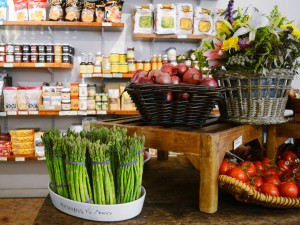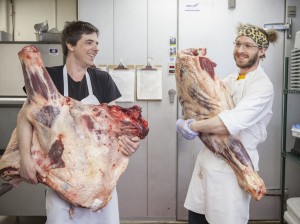me: Hi, hope all is well. I am taking sustainability courses this semester and lately one of the topics has been about agriculture. I recall you were serious about buying organic foods. Could you tell me your experience so I can have a lot to talk about? I watched the documentary called Food, Inc. and it is prompting me to get more organic stuff because the way nonorganic food esp. meat were produced looked a bit disturbing
my cousin: What about my experience would be helpful for you to hear about? I started getting into organic when I became pregnant w/ Ascher and learned about how harmful non-organic foods are. As a parent, it’s critical for me to provide only the best for my child(ren) and since you’re what you eat, I’m adamant about my kids only eating organic. Let me know what specifically you’re looking for from my experience so I can expand on that.
me: That’s a great thinking. I think this would give me enough to talk about during class. In Food, inc. Documentary it does once show one mother feeling guilty of feeding her kids fast food
my cousin:
OK, glad that was helpful. I’ve been purposely staying away from watching films like Food, Inc. b/c I already “know too much” and watching something like that would just sicken me even further. Frankly, my kids have never been to a fast food restaurant, and I’ve zero plans to ever take them. I’m not trying to be an elitist and judge no one who does differently from myself. But I just don’t see why I need to compromise on my beliefs when it’s relating to my kids (and their health!) so someone else can feel more comfortable.
In any case, going “organic” is beneficial in so many ways. Not only is it pesticide-free (something like Roundup should be banned, it’s so hazardous), but with the “organic” label, there are other things that come automatically that just makes it convenient. Things like it being non-GMO, no artificial coloring, etc. that have “potential” health (and behavioral) implications.
I understand the “organic” labelling is expensive to attain so if I know the “source”, I’m OK that it’s not “organic”. For example, there are farmers or ranchers who are strong believers of healthy food and grow their products in healthy, sustainable way. It may be that the cows or chickens are grass-fed/free-range, with no hormone or antibiotic injections and I’m good with my kids eating such meat. Organic labelling isn’t everyhing. If you look at cornucopia.org, you’ll see that not organic brands are the same (e.g. don’t ever bother w/ Horizon brands, you might as well eat conventional brands).
There are SO much information (and mis-information) out there, so depends on what you’d like to talk about specifically in your class, focus your research. It’s a VERY big topic that’d take you in million different directions. I’ve been at this for 5+ years and there are still new information that I come across all the time.



Recent Comments